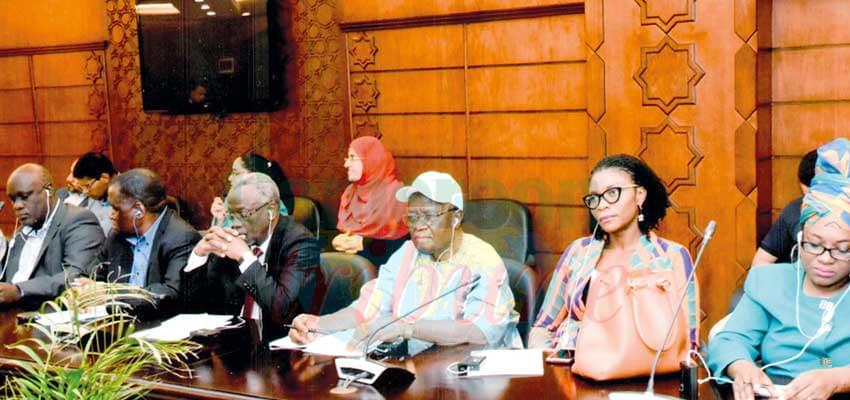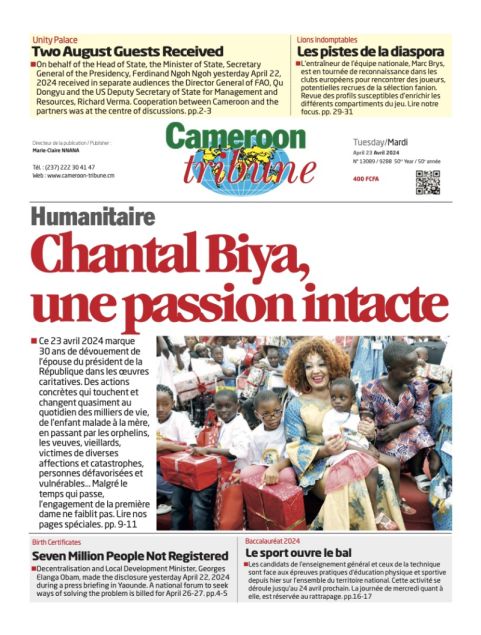Media and Sustainable Development : Where lies the Task
- Par Shey Peter MABU
- 05 août 2019 15:19
- 0 Likes

For any Development Project to be sustainable, human and physical resources on which it depends must be viable. Infrastructure should be available, adequate, and reliable.
For any Development Project to be sustainable, human and physical resources on which it depends must be viable. Infrastructure should be available, adequate, and reliable.
Human resources need to be well – equipped to render viable the physical resources whose viability is needed for the attainment of goals. Furthermore, for development to be sustainable, it is important for personnel to be professionally competent to know what is at stake and how to accomplish tasks.
In this light, the people behind the development projects need to know the importance of what is being undertaken, who is best placed to do what, and how it can be done to succeed.
Without knowledge of what is being done to attain goals and how to go about it, funds and labour could be wasted. Worse, very little or nothing would be achieved. This explains why besides general education, specialized courses are offered to prepare human resource for various fields of service.
Catalyst
It is important to note that after formal education in classrooms, acquisition of knowledge continues through the use of the (media, print and electronic,) seminars, workshops, and conferences. Considering the role of the press as one of the powers in the realm of governance, it is in fact, indispensable in sustainable development. Hence, it should be well-managed by media professionals who should be trained to serve with commitment.
Since the media face the important task of informing adequately and objectively, explaining and sensitizing, what is gathered, processed and disseminated should be carefully handled, so that messages can reach target audiences.
People for example, have to know why certain projects are being undertaken, or given priority in development. What is needed to attain goals and contributions expected from them for to development should be made known and minds sensitized to join in what is being undertaken. They need the means of getting this knowledge and who doubts the role of the press?
Through the media, the public is educated on the importance of partnerships, cooperation and the incentives of effective production. It is also through the press that the public is taught the importance of transparency in management, efficiency, and how to mobilise workers to acquire skills necessary for fruitful results.
Through the media the public is also informed about the dangers of corruption, tribalism, embezzlement, fraud, inertia, laziness, cheating and lack of duty – consciousness in stewardship. These, it must be made clear, are the stumbling blocks to developmental efforts.
At the Cameroon Tribune, (Cameroon’s bilingual Daily), besides playing the role of informing and entertaining through our various publications, press men in their, editorials, commentaries, investigative reports, analysis, and special reports, educate the masses to be aware of what is being undertaken in their interests. Through this, the masses also learn to contribute their quotas towards developmental projects being undertaken.
Target Audiences
In media mobilization for development, the target audiences are decision makers: parliamentarians, members of Government, councilors, managers, contractors, entrepreneurs, the judiciary, traditional authorities and the labour forces in all professions.
Youths, women, the girl child, the elderly, and even handicapped are important, considering their various contributions to development and the challenge to develop their skills. Professionals in all walks of life have to know what is expected of them when it comes to contributing to development.
Education and its importance to the nation should be stressed not only to those in school, but also to parents and guardians. In order to demonstrate the importance attached to the education of masses, government invests not only in educational infrastructure and professional schools, but also in media infrastructure that make possible the training of professionals. To be effective in this, the press should be free to educate objectively and adequately. It should play the role of a watch dog of the society in general, and target audiences in particular.
This is also considered very important because ignorance or lack of information constitutes one of the setbacks to development in several ways. For, without educational i...
Cet article complet est réservé aux abonnés
Déjà abonné ? Identifiez-vous >
Accédez en illimité à Cameroon Tribune Digital à partir de 26250 FCFA
Je M'abonne1 minute suffit pour vous abonner à Cameroon Tribune Digital !
- Votre numéro spécial cameroon-tribune en version numérique
- Des encarts
- Des appels d'offres exclusives
- D'avant-première (accès 24h avant la publication)
- Des éditions consultables sur tous supports (smartphone, tablettes, PC)














Commentaires